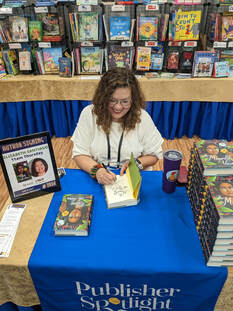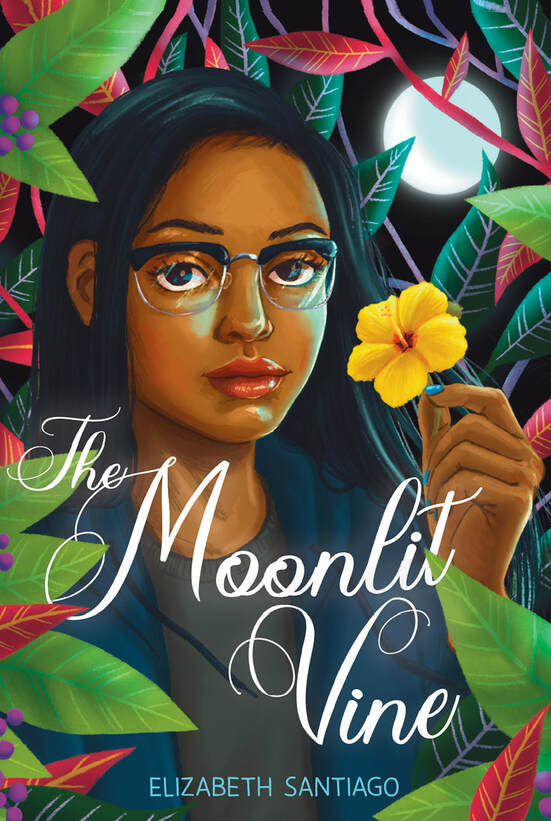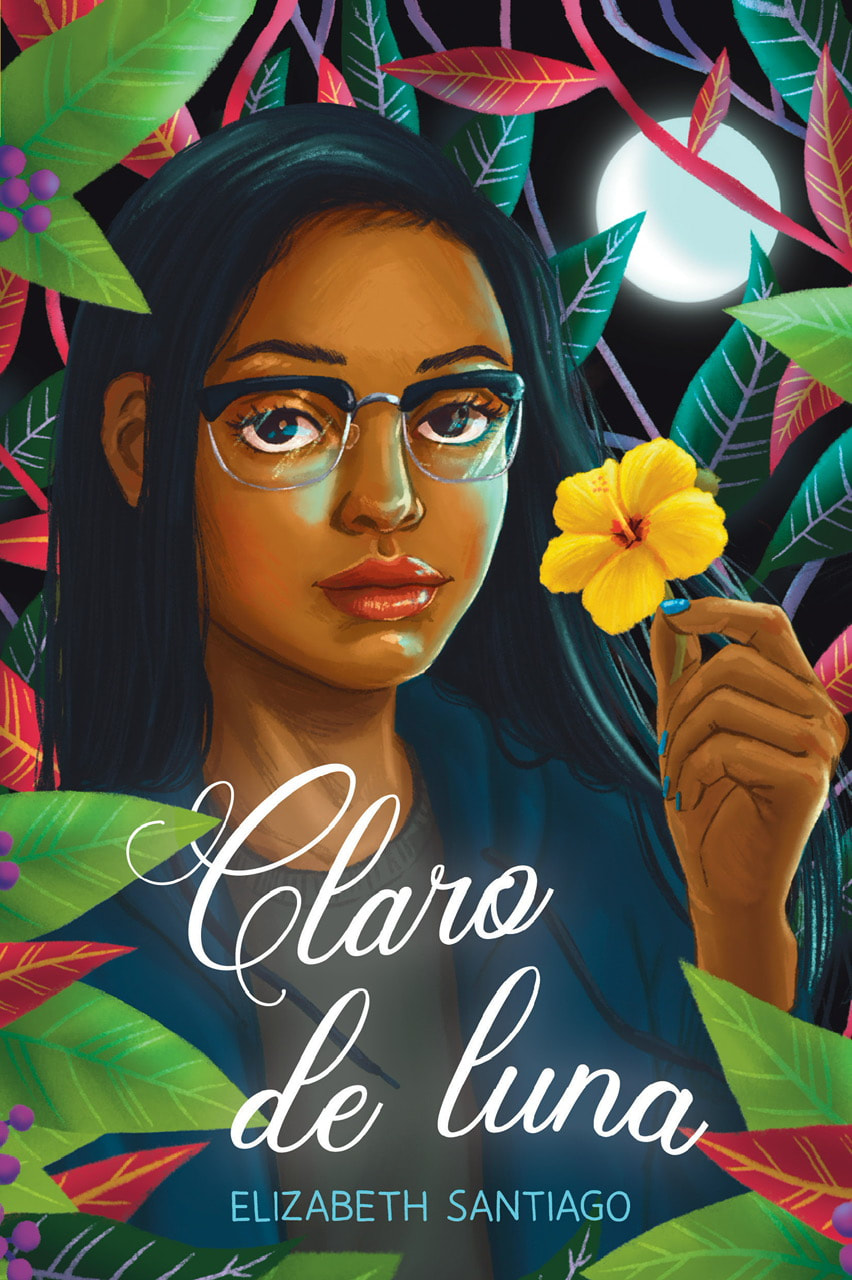|
Join us in celebrating The Moonlit Vine book birthday! We sat down with Musa Elizabeth Santiago to learn all about the inspiration behind this book. But first, a little bit about this novel: Despite her name, Taína Perez doesn't know anything about her Taíno heritage, nor has she ever tried to learn. After all, how would ancient Puerto Rican history help with everything going on? But life takes a wild turn when her abuela tells her she is a direct descendant of Anacaona, the beloved Taíno leader, warrior, and poet, who was murdered by the Spanish in 1503. Abuela also gives her an amulet and a zemi and says that it's time for her to step into her power like the women who came before her. But is that even possible? People like her hardly make it out of their circumstances, and the problems in her home and community are way bigger than Taína can manage. Or are they? A modern tale with interstitial historical chapters, The Moonlit Vine brings readers a powerful story of the collective struggle, hope, and liberation of Puerto Rican and Taíno peoples. How would you describe your main character? Why did you create your character that way? Taína, Ty, Perez is 14 years old and, like many of the girls I grew up with (including myself), had a lot more to offer the world than we were often allowed. I wanted Ty to be a smart girl who isn’t shy about letting the adults around her know she’s smart. The book opens with a tense scene between her and one of her teachers after Ty has gotten into trouble for calling her teacher out on the teacher’s problematic behavior. It’s a scene that shows that Ty is not afraid to stand up for what she believes in even when it's not in her best interest. Once she learns the incredible story of her ancestry, it doesn’t take long for her to understand that her family history gives her even more power and that the knowledge of her ancestry builds her confidence to continue to fight for what’s right. Where did you get the idea to write this particular story? As a Puerto Rican woman, I had always been told and always believed that I was Taíno. My mother often said, “nosotros somos Indios, Africanos y Españioles.” Loosely translated, she said, “We are made up of Indian, African, and Spanish ancestry.” Growing up I knew a lot about the Spanish and a little less about my African ancestors, but very little to nothing about my Indian—or rather, Taíno—ancestors. And I looked for many years! What is documented comes from early journal writings, letters, and stories shared by Spanish (and other) colonizers—stories that have created the dominant narrative that the Taíno did not survive. That false narrative has been debunked through the prevalence of DNA testing. (Well, our elders already knew the narrative was false, but science finally caught up). With renewed excitement, I continued to research and learn. I read all I could on the Taíno, but I wasn’t satisfied. I had yet to find a story that presented the Taíno as strategic—a people who understood that genocide was happening and fought in ways that ensured their survival even if not necessarily on their own terms. I also wondered how historical trauma affects our present-day lives, how the past is connected to the present. But I couldn’t find a work of fiction or nonfiction that shared what I hoped to understand or express. At a 1981 speech to the Ohio Arts Council, the late amazing literary genius Toni Morrison said, "If there's a book that you want to read, but it hasn't been written yet, then you must write it.” I took those words seriously, which is what set me on the journey to write The Moonlit Vine. A book to name how vital the Taíno were to not only my survival, but also the survival of my family and many, many others. How much their joy, intelligence, and love continue to shape me and others to the present day. This novel is my way of sharing my deep gratitude and respect for them. What was the most difficult scene to write in this story? Another impetus for the book was reading about a 7-year-old boy who had been tasered and handcuffed in his elementary school for “acting out.” My own son was 7 years old at the time I read this article and it greatly disturbed me because when I saw the picture of the child, he looked very much like my son. As a mother, I couldn’t imagine the feelings of pain and anger you would feel after you heard your child (your seven-year-old baby!) had been arrested. The very first scene I wrote for The Moonlit Vine was the one where Ty’s 7-year-old brother was handcuffed at his own school for also “acting out.” I put all of the emotion I could as a mother of a young boy myself into that scene and it still makes me emotional each time I read it. What message are you hoping readers will take away from this story? As I wrote this book, parts of me began to heal. I had a better handle on the historical forces and situations that made me, me. I can’t say whether others will walk away feeling the same, but I sincerely hope readers will take away the message of love – love of our ancestors and hope for the future. That communities are better together, and that young people can change the world for the better. What comes next for you as an author? Now I am hooked! Writing and publishing a book is hard work, but now that The Moonlit Vine is out in the world (or soon to be out) I am ready for more. I’m working on another young adult book and an adult contemporary. I have a lot of ideas for stories and built confidence in myself as a writer during the process of writing and publishing The Moonlit Vine. I finally feel like I found my voice as a writer, and I want to tell more stories! The Moonlit Vine title in Spanish is Claro de Luna.  Elizabeth Santiago grew up in Boston, MA with parents who migrated from San Sebastián, Puerto Rico in the 1960s. The youngest of nine, Elizabeth was entranced by the stories her mother, father, aunts and uncles, and community elders told her. Later, she sought to capture and honor those narratives and share them with the world. She earned a BFA in creative writing from Emerson College, a master's in education from Harvard University, and a PhD in education studies from Lesley University. She still lives in Boston with her husband Kevin and son Ezekiel, but travels to Puerto Rico as often as she can to feel even closer to her ancestors, culture, and heritage. Instagram: @liznarratives Twitter: @liznarratives
0 Comments
Leave a Reply. |
Las Musas SpeakWelcome to our blog! Archives
July 2024
Categories
All
|



 RSS Feed
RSS Feed